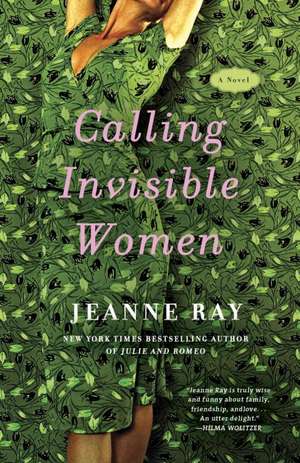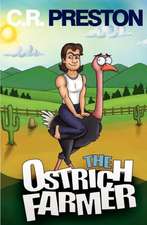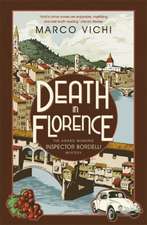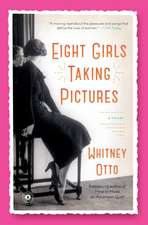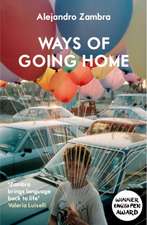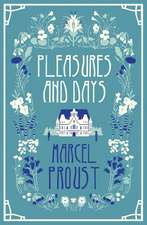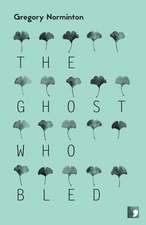Calling Invisible Women
Autor Jeanne Rayen Limba Engleză Paperback – 18 mar 2013
A mom in her early fifties, Clover knows she no longer turns heads the way she used to, and she's only really missed when dinner isn't on the table on time. Then Clover wakes up one morning to discover she's invisible--truly invisible. She panics even more when her family doesn't notice a thing. Her best friend immediately observes the change, which relieves Clover immensely--she's not losing her mind after all!--but she is crushed by the realization that neither her husband nor her children ever truly look at her. She was invisible even before she knew it.
Clover discovers that there are others like her, women of a certain age who seem to have disappeared. As she uses her invisibility to get to know her family and her town better, Clover leads the way in helping invisible women become recognized and appreciated no matter what their role.
Now with Extra Libris material, including a reader’s guide and bonus content
Preț: 100.57 lei
Nou
Puncte Express: 151
Preț estimativ în valută:
19.24€ • 20.14$ • 16.02£
19.24€ • 20.14$ • 16.02£
Carte disponibilă
Livrare economică 10-24 martie
Preluare comenzi: 021 569.72.76
Specificații
ISBN-13: 9780307395061
ISBN-10: 0307395065
Pagini: 255
Dimensiuni: 133 x 203 x 15 mm
Greutate: 0.21 kg
Editura: BROADWAY BOOKS
ISBN-10: 0307395065
Pagini: 255
Dimensiuni: 133 x 203 x 15 mm
Greutate: 0.21 kg
Editura: BROADWAY BOOKS
Extras
9780307395054|excerpt
Ray / CALLING INVISIBLE WOMEN
one
I first noticed I was missing on a Thursday. Red and I had already been for our walk and he went to sleep on the bath mat while I was taking my shower. Red is a Cairn terrier. He’s bath mat size. After the shower I was standing in front of the mirror in a toweling robe brushing my teeth. When I looked up I was gone.
It didn’t startle me at first, not exactly. I thought it was just some trick of the light, a fog that had built up on the mirror, but when I wiped my sleeve over the medicine cabinet I still wasn’t there. My toothbrush was there, floating by itself several inches out from the cuff of my robe, and the robe was there, the collar and shoulders filling out the bottom of the mirror’s frame, but I was missing. I moved from side to side a couple of times trying to fit myself back into the picture, but all I saw was the open shower curtain behind me, the tiles of the tub, the built-in shelf that held the shampoo and conditioner. I spat out the toothpaste and there it was in the sink looking exactly like toothpaste. That was when I thought: stroke. Pieces of my vision were missing, even though I couldn’t imagine what kind of stroke would just remove a face, a neck, a hand. Leaning forward toward the mirror, I gently tapped my invisible fingers against my invisible cheek and what had once been a finger was stopped by what had once been a face. Curiosity was quickly being replaced by a rising wall of panic. I was fifty-four years old, and I was gone.
“Red?” I said, trying out my voice. Unlike the rest of me, my voice was still there. Red lifted his head from the bath mat and looked straight at me, his brown eyes bright and full of recognition. He wagged his tail, thinking that maybe I wanted to go for another walk. Tentatively, I held out my invisible hand to him, wondering if I was dead and, if I was, what effect it would have on the poor dog. But Red sniffed the place where my hand should have been and gave it a couple of licks. I felt the rough wash of his tongue working over my phantom wrist, which I took to be a good sign, and so I went back to the mirror again. Still not there.
I went into the bedroom feeling light-headed, or feeling like someone who didn’t have a head, and, sitting down on the edge of the bed (which gave a creak of recognition), I picked up the phone and dialed the back-line number at Arthur’s office. I suppose that any day one finds one’s self to be invisible was not going to shape up to be a lucky day, so when Arthur’s nurse Mary answered I shouldn’t have been surprised. Arthur has three nurses and getting Mary on the phone was the definite equivalent of drawing the short straw.
“Dr. Hobart’s office,” she said, impatient from the start.
“Mary, it’s Clover. I need to speak to Arthur.” I was struggling not to hyperventilate.
I could see her shaking her head. “He’s in with a patient. Is there something I can help you with?”
Maybe she thought I was calling in regard to a sick child, even though she knew that Nick was twenty-three and Evie was twenty. “Can you get him for me?”
“He has patients waiting in all five of the exam rooms with fourteen more in the waiting room.” Her voice was both flat and brisk. “He’s in with the mayor’s wife now. Their second-grader has a rash. It could be a tick bite. We’ve got a vomiting toddler in room three and a first-time mother in room one who has brought in a week’s worth of used diapers that she has been refrigerating because she thinks the stool is inconsistent.”
“I get it,” I said, though there was nothing even notable about her report. This was Arthur’s day, all day, every day, from the minute he walked in the door of his office until the minute he left, and even when he left, much of his work managed to follow him home. I understood it was her job to protect him in any way possible, to use herself to create a human shield between him and the world, but I never did appreciate the fact that she applied that same shield against me. I almost never called the office.
“Is it an emergency?” Mary asked.
“It is.”
“Okay,” she said, but I could tell she had already been distracted. I could hear a shrill screaming in the background, and then, abruptly, the line went dead.
So there I was, the phone levitating in midair. I stared at it for a minute before hanging up. Even if I’d gotten Arthur on the line he no doubt would have told me that children don’t become invisible and so he wouldn’t know anything about it. Arthur had a way of making it sound like he had attended some special sort of junior medical school at which he had received absolutely no information whatsoever about the human body past the age of sixteen. It was his means of deflecting grown-ups who casually hit him up for Adderall prescriptions at dinner parties, but it also meant he never was much of a help to the adult members of his own family.
And who’s to say I was invisible anyway? If I was cracking up, if I’d just suffered some sort of cerebral hemorrhage, I would in fact be a poor judge of the situation. I tightened the belt on my robe and I marched up the stairs to Nick’s room, Red right behind me. I could feel my bare feet against the floor. Nick is our oldest, and I opened the door to his room without knocking because he had gone away to college and stayed away for almost two years after graduating. I had made his room my office: a desk, a lamp, a chair. My mother had made my room a sewing room when I moved away. Now my computer was back in the kitchen. “Nick!” I said to the man who was sleeping face down and shirtless in a pile of crumpled sheets. “Nicky, wake up!”
When he didn’t wake up I took hold of his heel with my invisible hand and shook it. I could see his entire leg turning back and forth inside the flannel pajama bottoms I had bought for him two Christmases ago; I could feel the heat of his heel in my palm. Red jumped into the bed and stood for a moment on Nick’s back. In our household, only Red had experienced unequivocal joy at Nick’s return.
“What?” he said into his pillow. It wasn’t quite eight in the morning. It was for Nick an unseen hour.
“I need you to look at me.”
“You look fine,” he said, or I think that’s what he said. He hadn’t lifted his head.
I flicked the switch to the overhead lights, and then I went to the windows and snapped up the rolling shades. With admirably quick reflexes, Nick drew himself into a ball and howled the howl of all vampires exposed to sunlight. In the light I could see that the room, which I had told him he would have to clean himself when he moved home six months ago, had not been cleaned. He scrunched his pillow down over the back of his head while Red buried his nose into the covers in search of Nick’s nose.
“What?” he cried, either to me or the dog.
“I need you to tell me if you can see me.” I was trying to keep my voice steady but I could hear the panic.
He rolled over, blinking in my general direction. The light was burning his eyes. He pressed his chin down to his chest, lengthening his neck like a turtle. “What’s this about?”
“Do. You. See. Me.”
“You don’t like your bathrobe anymore? You want to know if it’s becoming? I don’t know what you’re asking.”
“How can you not know what I’m asking? Am I here?”
Nick had been a history major at Oberlin, and though we had begged him to consider a minor in business, he had gone for women’s studies instead. Women’s studies, he informed us at the time, was a brilliant way to meet girls. “Are you having some sort of breakdown?”
“I might be.” My robe was shaking.
“If you feel like I don’t appreciate you, well,” he said, rubbing his eyes, “it’s because I don’t. I will again, but not until at least ten, okay?” He put his arm over the dog and pulled him in tight like a wide receiver ready for a forty-yard run. “Please pull the shades on your way out.”
That was when I turned and looked in the mirror over his dresser. There I was, my hair dripping and uncombed but recently touched up for gray, my cheeks bright red from a combination of fear and rosacea. I was back, so completely and utterly returned it was as if I had never been gone at all.
...
Maybe it was just some weird aphasia, except instead of a temporary loss of speech I had experienced a selective loss of vision. As I dried my hair and put on the little bit of makeup that I associated with my own human dignity, I stared hard at my reflection, checking for any fuzziness or missing spots. Even after I was dressed I kept going back to the mirror to make sure I was still there. I couldn’t spend more than two minutes away. Sure, I could see my hands, my legs, but was my face still there? My neck? Back I would go to check again. Spending a morning staring at oneself was hardly the short path to peace of mind. It was the mirror, after all, that had driven Snow White’s stepmother around the bend with its unrelentingly frank assessment of the situation. Soon my worry about invisibility had been replaced by a cataloguing of flaws: my eyelids were drooping in a weird way that made my entire face look asymmetrical, and the crease between my eyebrows made me look as if I had been struck in the forehead by a very small ax. And my mouth! Where had my lips disappeared to over the years? I preferred the picture of myself I kept in my imagination, the one in which my hair could still be braided into a thick rope and I was in the neighborhood of thirty-five.
I went across the street and three houses down to the Kemptons’. I knocked on Gilda’s door.
“Have you ever noticed that my eyelids are uneven?” I asked her. I was standing on the porch. There was a cold wind prying the last of the red leaves off the maple tree in her front yard and I shivered. That time of year thou mayst in me behold when yellow leaves, or none, or few, do hang.
“Come inside,” she said. She put her hands on my shoulders and moved me around in the light as if she was having trouble seeing me.
Upon those boughs which shake against the cold. Bare ruined choirs, where late the sweet birds sang.
“I need to get my glasses,” she said.
Gilda and Steve Kempton had five children, all of them boys, and their house always had the vague aura of a summer camp, even though four of those boys were technically grown and three of them were actually gone. There were always helmets and hockey sticks in the front hallway, always an odd number of tennis shoes on the stairs. In the summer the floors had a vaguely sandy crunch to them even though we lived in Ohio, and nowhere near a beach. Benny, the baby, was in high school now, and Miller, who was the second to the oldest, had boomeranged straight back into his childhood bedroom the day after graduating from college and had been there for more than a year. I believed that it was Miller who set the bad example for Nick.
Gilda came back with a pair of readers and, looking through her glasses, gave my eyelids serious consideration. Then she put her thumb between my eyebrows and made little circles over the crease there. “I tried that,” I said. “It doesn’t go away.”
“Botox.” She tapped her own forehead, a smooth lake of tranquillity.
“I did that once. You know I don’t like needles. And anyway, the wrinkles grew back.”
She shrugged and looked again. “You don’t really notice it,” she said, but not in a way that made me feel better. Gilda and I had been friends for twelve years, ever since we’d moved into the neighborhood. It was her honesty that I counted on. If I needed a comforting lie I was perfectly capable of telling one to myself. She was walking into the kitchen, stepping over a couple of tennis racquets, and I followed her. She put the kettle on.
“So if you aren’t interested in needles, why are you making an assessment of your face? Your only two options are to fix it or live with it. There’s no point in just beating yourself up about it.”
“The thing is,” I started tentatively, not knowing how to talk about what I wasn’t really sure had happened, “this morning—” I stopped.
Gilda, that source of constant motion, stopped as well. “This morning,” she said. I could tell she was thinking I was about to give her bad news.
“I was invisible.”
Gilda turned and got down two cups from the cabinet beside the sink, let out a dispirited sigh, and then dropped a tea bag in each of those cups. “I hate that.”
Something in my spine caught a small jolt of current and straightened to attention—it was understanding, recognition. It was everything I was hoping for. “It’s happened to you?”
Gilda lowered her chin and looked up at me, a move I now realized was meant to stand in for a knitted brow. “Are you kidding me? Except for a very few breakout moments, I’ve been invisible since the new millennium. The boys can be looking at naked women on Facebook and they don’t so much as twitch when I walk into the room. I can ask Steve what time he wants to eat dinner and he keeps on texting like I wasn’t even there. A woman wheels her cart right in front of mine and cuts into the checkout lane, a car cuts me off in traffic, I wave at the waiter and he’s looking at the wall behind my head. It’s just the plight of women after a certain age. No one can see you. Sometimes I find myself daydreaming about that girl I used to be, how I could always get a table in a busy restaurant. I could raise my hand on a street corner in New York in the pouring rain and get a taxi.” She shook her head at such an impossible memory. “That’s just gone now. We’re nothing but the ghosts of our former selves.”
“True,” I said. I had forgotten the feeling of going into a very busy restaurant at eight on a Friday night and getting a table without a reservation. “But that’s not what I’m talking about.”
“So what are you talking about?”
“Invisibility. Literal invisibility.” I sounded less than certain. Gilda and I told each other pretty much everything but I found these words were heavy in my mouth.
“You mean where you walk right up to someone and it’s as if they can’t even see you?”
“No, where I look in the mirror and can’t see myself.” There was nothing metaphorical about it.
“Does this have to do with Arthur?”
“He wasn’t even there. It was after he’d left for work.”
“No, but I mean he’s been very busy lately. You’ve said it yourself. You hardly ever see him.”
“Which is not the same thing as hardly ever seeing myself. Do you think this is hysterical invisibility? I’m developing some strange new disease in an effort to get the doctor’s attention? The only way I could get Arthur’s attention, medically speaking, is with a bad case of cradle cap.”
“He can’t help how busy he is,” Gilda said defensively. “He’s busy because he’s good. He’s busy because everybody loves him.”
Everybody including Gilda. Not long after we’d moved into the neighborhood, Arthur dislodged a grape from Benny’s windpipe at a Fourth of July party and saved his life. Arthur had noticed that Benny, who was only three at the time, was standing stock-still in the middle of a crowd of adults, just standing there, not even blinking. Arthur said later he knew something was wrong because he’d never seen Benny stand still before. He grabbed the boy’s ankles and, flipping him over in midair, shook him like a pillowcase. Out popped the grape, which was followed by the enormous wail the grape had blocked in his throat. With a little cajoling, Benny got over the shock of it almost immediately. Gilda never did. “This has nothing to do with Arthur,” I said.
“Okay.” Gilda tilted her head slightly to the side. “So can you see yourself now?”
“Of course I can see myself now.” I held out my arm to show us both. “I’m not delusional, at least I don’t think I am. I got out of the shower this morning and for a few minutes I couldn’t see myself.”
“I don’t think I’d mind that,” Gilda said.
I threw up my hands. “I swear to you this isn’t coming around to a punch line. I can’t explain what happened, but it did happen, and then it was over. I guess I was just wondering . . .”
“Wondering what?”
“If it ever happened to you.”
The kettle let out its high-pitched wail and Gilda rescued it from the flame and filled our cups. “No,” she said tentatively. “Not if we’re talking about a lack of physical matter. Have you had your eyes checked?”
I shook my head.
“I wonder if French women ever feel invisible,” she said, deftly trying to steer the subject away from the personal and toward the cultural. “People are always talking about how chic and secure French women are, but if the twenty-year-old Brigitte Bardot passed the seventy-six-year-old Brigitte Bardot on the street, there isn’t going to be any contest as to who gets noticed.”
That was when I came to the conclusion that feeling invisible was something that could be talked about for hours on end but being invisible was a conversational no-man’s-land. I blew on my tea and looked at my watch. “I should probably get to work. I’ve got a column due. Is it okay if I just take the cup with me?”
“Of course you can take the cup, but I haven’t been any help at all.” Gilda sounded genuinely sorry.
I waved her off. “I’m fine,” I said. “I just needed to talk.” In truth, maybe Gilda had been more of a help than she had realized. Maybe I had suffered a brief bout of insanity and by not acknowledging it, she was allowing me to keep my dignity. I had no real idea what had happened. I just had a strange, unsettled feeling, like you do when you’re out and think you might have left the oven on or the windows open in the rain. Later, of course, I found out this feeling was all part of it. Some of the women in the group call it an invisibility hangover, like every cell you’ve got has had a tiny whiplash from coming back into focus again.
When I got back to the house, Nick was sitting at the kitchen table eating a bowl of cereal, and Red, who didn’t even turn his face in my direction when I came in, was staring up at him. Nick always let Red lap up the last of the milk when he was finished with it. “You’re stirring awfully early,” I said without thinking.
“Thank you very much for that,” he said. “What was up with you this morning anyway?”
“This morning?” I asked, not wanting to do it all again.
“Do you see me?” Nick said, mimicking my panic in an unbecoming manner. He was working the crossword puzzle in the Times. His father must have been in a rush this morning. Since Nick had come home, Arthur usually remembered to hide the arts section so that he wasn’t left with the pathetic puzzle in the local paper.
“My contact lens was stuck,” I said, coming up with a slightly plausible lie. “I think I’m going to have to stop wearing them. My optometrist says I have dry eyes.”
“You don’t wear contact lenses, and even if you did, what would that have to do with whether or not I can see you?” He filled in an answer with a ballpoint pen. It was the Thursday puzzle. Not easy.
“I said, ‘I can’t see.’ I’m sorry. I just panicked for a minute.”
“You didn’t say, ‘I can’t see.’ You said, ‘Can you see me?’ There’s a difference. Mid-arthropod, six letters.”
“Do you have anything?”
“Starts with T.”
The T was what I needed because the word that had instantly come to mind was Lorax, a tufted Dr. Seuss character. “Thorax,” I said. “And about the rest of it, if you could just chalk it up to early dementia I would be grateful.”
Nick wrote in the word and seeing how nicely it fit, he smiled. My firstborn child had such a lovely smile it could be given out as a gift. “If you don’t ask me whether or not I found a job today, I won’t ask you if you’re losing your mind.”
“It’s a deal,” I said.
Then Nick put his cereal bowl on the floor, a few corn flakes floating in a thin lake of milk, sending Red into a frantic, lapping ecstasy. Everybody was happy.
Ray / CALLING INVISIBLE WOMEN
one
I first noticed I was missing on a Thursday. Red and I had already been for our walk and he went to sleep on the bath mat while I was taking my shower. Red is a Cairn terrier. He’s bath mat size. After the shower I was standing in front of the mirror in a toweling robe brushing my teeth. When I looked up I was gone.
It didn’t startle me at first, not exactly. I thought it was just some trick of the light, a fog that had built up on the mirror, but when I wiped my sleeve over the medicine cabinet I still wasn’t there. My toothbrush was there, floating by itself several inches out from the cuff of my robe, and the robe was there, the collar and shoulders filling out the bottom of the mirror’s frame, but I was missing. I moved from side to side a couple of times trying to fit myself back into the picture, but all I saw was the open shower curtain behind me, the tiles of the tub, the built-in shelf that held the shampoo and conditioner. I spat out the toothpaste and there it was in the sink looking exactly like toothpaste. That was when I thought: stroke. Pieces of my vision were missing, even though I couldn’t imagine what kind of stroke would just remove a face, a neck, a hand. Leaning forward toward the mirror, I gently tapped my invisible fingers against my invisible cheek and what had once been a finger was stopped by what had once been a face. Curiosity was quickly being replaced by a rising wall of panic. I was fifty-four years old, and I was gone.
“Red?” I said, trying out my voice. Unlike the rest of me, my voice was still there. Red lifted his head from the bath mat and looked straight at me, his brown eyes bright and full of recognition. He wagged his tail, thinking that maybe I wanted to go for another walk. Tentatively, I held out my invisible hand to him, wondering if I was dead and, if I was, what effect it would have on the poor dog. But Red sniffed the place where my hand should have been and gave it a couple of licks. I felt the rough wash of his tongue working over my phantom wrist, which I took to be a good sign, and so I went back to the mirror again. Still not there.
I went into the bedroom feeling light-headed, or feeling like someone who didn’t have a head, and, sitting down on the edge of the bed (which gave a creak of recognition), I picked up the phone and dialed the back-line number at Arthur’s office. I suppose that any day one finds one’s self to be invisible was not going to shape up to be a lucky day, so when Arthur’s nurse Mary answered I shouldn’t have been surprised. Arthur has three nurses and getting Mary on the phone was the definite equivalent of drawing the short straw.
“Dr. Hobart’s office,” she said, impatient from the start.
“Mary, it’s Clover. I need to speak to Arthur.” I was struggling not to hyperventilate.
I could see her shaking her head. “He’s in with a patient. Is there something I can help you with?”
Maybe she thought I was calling in regard to a sick child, even though she knew that Nick was twenty-three and Evie was twenty. “Can you get him for me?”
“He has patients waiting in all five of the exam rooms with fourteen more in the waiting room.” Her voice was both flat and brisk. “He’s in with the mayor’s wife now. Their second-grader has a rash. It could be a tick bite. We’ve got a vomiting toddler in room three and a first-time mother in room one who has brought in a week’s worth of used diapers that she has been refrigerating because she thinks the stool is inconsistent.”
“I get it,” I said, though there was nothing even notable about her report. This was Arthur’s day, all day, every day, from the minute he walked in the door of his office until the minute he left, and even when he left, much of his work managed to follow him home. I understood it was her job to protect him in any way possible, to use herself to create a human shield between him and the world, but I never did appreciate the fact that she applied that same shield against me. I almost never called the office.
“Is it an emergency?” Mary asked.
“It is.”
“Okay,” she said, but I could tell she had already been distracted. I could hear a shrill screaming in the background, and then, abruptly, the line went dead.
So there I was, the phone levitating in midair. I stared at it for a minute before hanging up. Even if I’d gotten Arthur on the line he no doubt would have told me that children don’t become invisible and so he wouldn’t know anything about it. Arthur had a way of making it sound like he had attended some special sort of junior medical school at which he had received absolutely no information whatsoever about the human body past the age of sixteen. It was his means of deflecting grown-ups who casually hit him up for Adderall prescriptions at dinner parties, but it also meant he never was much of a help to the adult members of his own family.
And who’s to say I was invisible anyway? If I was cracking up, if I’d just suffered some sort of cerebral hemorrhage, I would in fact be a poor judge of the situation. I tightened the belt on my robe and I marched up the stairs to Nick’s room, Red right behind me. I could feel my bare feet against the floor. Nick is our oldest, and I opened the door to his room without knocking because he had gone away to college and stayed away for almost two years after graduating. I had made his room my office: a desk, a lamp, a chair. My mother had made my room a sewing room when I moved away. Now my computer was back in the kitchen. “Nick!” I said to the man who was sleeping face down and shirtless in a pile of crumpled sheets. “Nicky, wake up!”
When he didn’t wake up I took hold of his heel with my invisible hand and shook it. I could see his entire leg turning back and forth inside the flannel pajama bottoms I had bought for him two Christmases ago; I could feel the heat of his heel in my palm. Red jumped into the bed and stood for a moment on Nick’s back. In our household, only Red had experienced unequivocal joy at Nick’s return.
“What?” he said into his pillow. It wasn’t quite eight in the morning. It was for Nick an unseen hour.
“I need you to look at me.”
“You look fine,” he said, or I think that’s what he said. He hadn’t lifted his head.
I flicked the switch to the overhead lights, and then I went to the windows and snapped up the rolling shades. With admirably quick reflexes, Nick drew himself into a ball and howled the howl of all vampires exposed to sunlight. In the light I could see that the room, which I had told him he would have to clean himself when he moved home six months ago, had not been cleaned. He scrunched his pillow down over the back of his head while Red buried his nose into the covers in search of Nick’s nose.
“What?” he cried, either to me or the dog.
“I need you to tell me if you can see me.” I was trying to keep my voice steady but I could hear the panic.
He rolled over, blinking in my general direction. The light was burning his eyes. He pressed his chin down to his chest, lengthening his neck like a turtle. “What’s this about?”
“Do. You. See. Me.”
“You don’t like your bathrobe anymore? You want to know if it’s becoming? I don’t know what you’re asking.”
“How can you not know what I’m asking? Am I here?”
Nick had been a history major at Oberlin, and though we had begged him to consider a minor in business, he had gone for women’s studies instead. Women’s studies, he informed us at the time, was a brilliant way to meet girls. “Are you having some sort of breakdown?”
“I might be.” My robe was shaking.
“If you feel like I don’t appreciate you, well,” he said, rubbing his eyes, “it’s because I don’t. I will again, but not until at least ten, okay?” He put his arm over the dog and pulled him in tight like a wide receiver ready for a forty-yard run. “Please pull the shades on your way out.”
That was when I turned and looked in the mirror over his dresser. There I was, my hair dripping and uncombed but recently touched up for gray, my cheeks bright red from a combination of fear and rosacea. I was back, so completely and utterly returned it was as if I had never been gone at all.
...
Maybe it was just some weird aphasia, except instead of a temporary loss of speech I had experienced a selective loss of vision. As I dried my hair and put on the little bit of makeup that I associated with my own human dignity, I stared hard at my reflection, checking for any fuzziness or missing spots. Even after I was dressed I kept going back to the mirror to make sure I was still there. I couldn’t spend more than two minutes away. Sure, I could see my hands, my legs, but was my face still there? My neck? Back I would go to check again. Spending a morning staring at oneself was hardly the short path to peace of mind. It was the mirror, after all, that had driven Snow White’s stepmother around the bend with its unrelentingly frank assessment of the situation. Soon my worry about invisibility had been replaced by a cataloguing of flaws: my eyelids were drooping in a weird way that made my entire face look asymmetrical, and the crease between my eyebrows made me look as if I had been struck in the forehead by a very small ax. And my mouth! Where had my lips disappeared to over the years? I preferred the picture of myself I kept in my imagination, the one in which my hair could still be braided into a thick rope and I was in the neighborhood of thirty-five.
I went across the street and three houses down to the Kemptons’. I knocked on Gilda’s door.
“Have you ever noticed that my eyelids are uneven?” I asked her. I was standing on the porch. There was a cold wind prying the last of the red leaves off the maple tree in her front yard and I shivered. That time of year thou mayst in me behold when yellow leaves, or none, or few, do hang.
“Come inside,” she said. She put her hands on my shoulders and moved me around in the light as if she was having trouble seeing me.
Upon those boughs which shake against the cold. Bare ruined choirs, where late the sweet birds sang.
“I need to get my glasses,” she said.
Gilda and Steve Kempton had five children, all of them boys, and their house always had the vague aura of a summer camp, even though four of those boys were technically grown and three of them were actually gone. There were always helmets and hockey sticks in the front hallway, always an odd number of tennis shoes on the stairs. In the summer the floors had a vaguely sandy crunch to them even though we lived in Ohio, and nowhere near a beach. Benny, the baby, was in high school now, and Miller, who was the second to the oldest, had boomeranged straight back into his childhood bedroom the day after graduating from college and had been there for more than a year. I believed that it was Miller who set the bad example for Nick.
Gilda came back with a pair of readers and, looking through her glasses, gave my eyelids serious consideration. Then she put her thumb between my eyebrows and made little circles over the crease there. “I tried that,” I said. “It doesn’t go away.”
“Botox.” She tapped her own forehead, a smooth lake of tranquillity.
“I did that once. You know I don’t like needles. And anyway, the wrinkles grew back.”
She shrugged and looked again. “You don’t really notice it,” she said, but not in a way that made me feel better. Gilda and I had been friends for twelve years, ever since we’d moved into the neighborhood. It was her honesty that I counted on. If I needed a comforting lie I was perfectly capable of telling one to myself. She was walking into the kitchen, stepping over a couple of tennis racquets, and I followed her. She put the kettle on.
“So if you aren’t interested in needles, why are you making an assessment of your face? Your only two options are to fix it or live with it. There’s no point in just beating yourself up about it.”
“The thing is,” I started tentatively, not knowing how to talk about what I wasn’t really sure had happened, “this morning—” I stopped.
Gilda, that source of constant motion, stopped as well. “This morning,” she said. I could tell she was thinking I was about to give her bad news.
“I was invisible.”
Gilda turned and got down two cups from the cabinet beside the sink, let out a dispirited sigh, and then dropped a tea bag in each of those cups. “I hate that.”
Something in my spine caught a small jolt of current and straightened to attention—it was understanding, recognition. It was everything I was hoping for. “It’s happened to you?”
Gilda lowered her chin and looked up at me, a move I now realized was meant to stand in for a knitted brow. “Are you kidding me? Except for a very few breakout moments, I’ve been invisible since the new millennium. The boys can be looking at naked women on Facebook and they don’t so much as twitch when I walk into the room. I can ask Steve what time he wants to eat dinner and he keeps on texting like I wasn’t even there. A woman wheels her cart right in front of mine and cuts into the checkout lane, a car cuts me off in traffic, I wave at the waiter and he’s looking at the wall behind my head. It’s just the plight of women after a certain age. No one can see you. Sometimes I find myself daydreaming about that girl I used to be, how I could always get a table in a busy restaurant. I could raise my hand on a street corner in New York in the pouring rain and get a taxi.” She shook her head at such an impossible memory. “That’s just gone now. We’re nothing but the ghosts of our former selves.”
“True,” I said. I had forgotten the feeling of going into a very busy restaurant at eight on a Friday night and getting a table without a reservation. “But that’s not what I’m talking about.”
“So what are you talking about?”
“Invisibility. Literal invisibility.” I sounded less than certain. Gilda and I told each other pretty much everything but I found these words were heavy in my mouth.
“You mean where you walk right up to someone and it’s as if they can’t even see you?”
“No, where I look in the mirror and can’t see myself.” There was nothing metaphorical about it.
“Does this have to do with Arthur?”
“He wasn’t even there. It was after he’d left for work.”
“No, but I mean he’s been very busy lately. You’ve said it yourself. You hardly ever see him.”
“Which is not the same thing as hardly ever seeing myself. Do you think this is hysterical invisibility? I’m developing some strange new disease in an effort to get the doctor’s attention? The only way I could get Arthur’s attention, medically speaking, is with a bad case of cradle cap.”
“He can’t help how busy he is,” Gilda said defensively. “He’s busy because he’s good. He’s busy because everybody loves him.”
Everybody including Gilda. Not long after we’d moved into the neighborhood, Arthur dislodged a grape from Benny’s windpipe at a Fourth of July party and saved his life. Arthur had noticed that Benny, who was only three at the time, was standing stock-still in the middle of a crowd of adults, just standing there, not even blinking. Arthur said later he knew something was wrong because he’d never seen Benny stand still before. He grabbed the boy’s ankles and, flipping him over in midair, shook him like a pillowcase. Out popped the grape, which was followed by the enormous wail the grape had blocked in his throat. With a little cajoling, Benny got over the shock of it almost immediately. Gilda never did. “This has nothing to do with Arthur,” I said.
“Okay.” Gilda tilted her head slightly to the side. “So can you see yourself now?”
“Of course I can see myself now.” I held out my arm to show us both. “I’m not delusional, at least I don’t think I am. I got out of the shower this morning and for a few minutes I couldn’t see myself.”
“I don’t think I’d mind that,” Gilda said.
I threw up my hands. “I swear to you this isn’t coming around to a punch line. I can’t explain what happened, but it did happen, and then it was over. I guess I was just wondering . . .”
“Wondering what?”
“If it ever happened to you.”
The kettle let out its high-pitched wail and Gilda rescued it from the flame and filled our cups. “No,” she said tentatively. “Not if we’re talking about a lack of physical matter. Have you had your eyes checked?”
I shook my head.
“I wonder if French women ever feel invisible,” she said, deftly trying to steer the subject away from the personal and toward the cultural. “People are always talking about how chic and secure French women are, but if the twenty-year-old Brigitte Bardot passed the seventy-six-year-old Brigitte Bardot on the street, there isn’t going to be any contest as to who gets noticed.”
That was when I came to the conclusion that feeling invisible was something that could be talked about for hours on end but being invisible was a conversational no-man’s-land. I blew on my tea and looked at my watch. “I should probably get to work. I’ve got a column due. Is it okay if I just take the cup with me?”
“Of course you can take the cup, but I haven’t been any help at all.” Gilda sounded genuinely sorry.
I waved her off. “I’m fine,” I said. “I just needed to talk.” In truth, maybe Gilda had been more of a help than she had realized. Maybe I had suffered a brief bout of insanity and by not acknowledging it, she was allowing me to keep my dignity. I had no real idea what had happened. I just had a strange, unsettled feeling, like you do when you’re out and think you might have left the oven on or the windows open in the rain. Later, of course, I found out this feeling was all part of it. Some of the women in the group call it an invisibility hangover, like every cell you’ve got has had a tiny whiplash from coming back into focus again.
When I got back to the house, Nick was sitting at the kitchen table eating a bowl of cereal, and Red, who didn’t even turn his face in my direction when I came in, was staring up at him. Nick always let Red lap up the last of the milk when he was finished with it. “You’re stirring awfully early,” I said without thinking.
“Thank you very much for that,” he said. “What was up with you this morning anyway?”
“This morning?” I asked, not wanting to do it all again.
“Do you see me?” Nick said, mimicking my panic in an unbecoming manner. He was working the crossword puzzle in the Times. His father must have been in a rush this morning. Since Nick had come home, Arthur usually remembered to hide the arts section so that he wasn’t left with the pathetic puzzle in the local paper.
“My contact lens was stuck,” I said, coming up with a slightly plausible lie. “I think I’m going to have to stop wearing them. My optometrist says I have dry eyes.”
“You don’t wear contact lenses, and even if you did, what would that have to do with whether or not I can see you?” He filled in an answer with a ballpoint pen. It was the Thursday puzzle. Not easy.
“I said, ‘I can’t see.’ I’m sorry. I just panicked for a minute.”
“You didn’t say, ‘I can’t see.’ You said, ‘Can you see me?’ There’s a difference. Mid-arthropod, six letters.”
“Do you have anything?”
“Starts with T.”
The T was what I needed because the word that had instantly come to mind was Lorax, a tufted Dr. Seuss character. “Thorax,” I said. “And about the rest of it, if you could just chalk it up to early dementia I would be grateful.”
Nick wrote in the word and seeing how nicely it fit, he smiled. My firstborn child had such a lovely smile it could be given out as a gift. “If you don’t ask me whether or not I found a job today, I won’t ask you if you’re losing your mind.”
“It’s a deal,” I said.
Then Nick put his cereal bowl on the floor, a few corn flakes floating in a thin lake of milk, sending Red into a frantic, lapping ecstasy. Everybody was happy.
Recenzii
“Witty and thought-provoking, Invisible Women will call out to any female who’s ever been made to feel invisible by virtue of her age, her gender, or both.”
—People (3 ½ stars)
“In a story both whimsical and significant, Jeanne Ray addresses an all-too-familiar fate that many women seem to suffer as they grow older…. Heartfelt, inspirational and uplifting, Calling Invisible Women calls out to readers with a passionate and important message. This book is clearly one that deserves to be noticed.”
—BookPage
“In her satirical tale of a woman trying to find herself, Ray, the mother of novelist Ann Patchett, offers a commentary about what it’s like for women to grow older.”
—New York Post, Required Reading
“Jeanne Ray’s newest novel, Calling Invisible Women, tells the humorous, touching story of how Clover reclaims her sense of self. Stripping off her clothes to go undetected, she becomes a sort of superhero: punishing bullies on the school bus, halting bank robberies, preventing her son from getting a tattoo—not to mention reigniting her career as an investigative journalist. Invisibility is hardly a subtle metaphor. But Ray argues persuasively that going undercover has its benefits.”
—O, The Oprah Magazine (Summer Pick), Abbe Wright
“This is a perfectly fabulous read that speaks volumes about society’s lack of awareness of middle-aged women. Read it as fast as you can, before it disappears before your eyes.”
—Library Journal, starred review
“The heroine of bestselling novelist Jeanne Ray's Calling Invisible Women bands together with other invisible women in her town to fight back, gaining a new view of her town, her loved ones and herself… Ray, who didn't start writing novels until she was 60 - inspired partly by the urge to show that people "of a certain age" had as much fun and delight in their lives as younger folk - said a liking on her part for people with superpowers, like invisibility, gave the book its driving impetus… Julie and Romeo, the story of two people over 60 who find new romance - and the first of six novels, many of which center on women in their 50s and 60s and have led Ray to be dubbed "the mother of senior literature," a title she says she finds hilarious. While still in the draft stage, Ray received advice on her first book from her daughter, award-winning novelist Ann Patchett, who has written Bel Canto and other books.”
—Reuters
“Every homemaker who feels she's taken for granted should open Calling Invisible Women and meet Clover Hobart, who looks in the bathroom mirror one day and realizes that not only does she feel invisible, she is invisible…. Fans of Jeanne Ray know that (as with her 2003 debut Julie and Romeo) we'll come to feel that we know Clover and sympathize with her plight. It's readers' good fortune that Ray brings her light, smart touch to this comic take on women of a certain age who feel they've disappeared. A comic tale of a middle-aged woman whose family doesn't notice her--even when she actually disappears.”
—Shelf Awareness
“The characters in this fast, fun read are empowered and proactive.”
—Publishers Weekly
“Women of a certain age will devour Ray’s sly satire on the perils of big pharma, middle age, and the unseen consequences of living the quiet life.”
—Booklist
“Offers a lot of witty charm.”
—Kirkus
“Jeanne Ray is truly wise and funny about family, friendship, and love—about the ways in which we see (and don’t see) each other. Calling Invisible Women is an utter delight.”
—Hilma Wolitzer
—People (3 ½ stars)
“In a story both whimsical and significant, Jeanne Ray addresses an all-too-familiar fate that many women seem to suffer as they grow older…. Heartfelt, inspirational and uplifting, Calling Invisible Women calls out to readers with a passionate and important message. This book is clearly one that deserves to be noticed.”
—BookPage
“In her satirical tale of a woman trying to find herself, Ray, the mother of novelist Ann Patchett, offers a commentary about what it’s like for women to grow older.”
—New York Post, Required Reading
“Jeanne Ray’s newest novel, Calling Invisible Women, tells the humorous, touching story of how Clover reclaims her sense of self. Stripping off her clothes to go undetected, she becomes a sort of superhero: punishing bullies on the school bus, halting bank robberies, preventing her son from getting a tattoo—not to mention reigniting her career as an investigative journalist. Invisibility is hardly a subtle metaphor. But Ray argues persuasively that going undercover has its benefits.”
—O, The Oprah Magazine (Summer Pick), Abbe Wright
“This is a perfectly fabulous read that speaks volumes about society’s lack of awareness of middle-aged women. Read it as fast as you can, before it disappears before your eyes.”
—Library Journal, starred review
“The heroine of bestselling novelist Jeanne Ray's Calling Invisible Women bands together with other invisible women in her town to fight back, gaining a new view of her town, her loved ones and herself… Ray, who didn't start writing novels until she was 60 - inspired partly by the urge to show that people "of a certain age" had as much fun and delight in their lives as younger folk - said a liking on her part for people with superpowers, like invisibility, gave the book its driving impetus… Julie and Romeo, the story of two people over 60 who find new romance - and the first of six novels, many of which center on women in their 50s and 60s and have led Ray to be dubbed "the mother of senior literature," a title she says she finds hilarious. While still in the draft stage, Ray received advice on her first book from her daughter, award-winning novelist Ann Patchett, who has written Bel Canto and other books.”
—Reuters
“Every homemaker who feels she's taken for granted should open Calling Invisible Women and meet Clover Hobart, who looks in the bathroom mirror one day and realizes that not only does she feel invisible, she is invisible…. Fans of Jeanne Ray know that (as with her 2003 debut Julie and Romeo) we'll come to feel that we know Clover and sympathize with her plight. It's readers' good fortune that Ray brings her light, smart touch to this comic take on women of a certain age who feel they've disappeared. A comic tale of a middle-aged woman whose family doesn't notice her--even when she actually disappears.”
—Shelf Awareness
“The characters in this fast, fun read are empowered and proactive.”
—Publishers Weekly
“Women of a certain age will devour Ray’s sly satire on the perils of big pharma, middle age, and the unseen consequences of living the quiet life.”
—Booklist
“Offers a lot of witty charm.”
—Kirkus
“Jeanne Ray is truly wise and funny about family, friendship, and love—about the ways in which we see (and don’t see) each other. Calling Invisible Women is an utter delight.”
—Hilma Wolitzer
Notă biografică
JEANNE RAY is the New York Times bestselling author of Julie and Romeo and four other novels. She worked as a registered nurse for forty years before she wrote her first novel at the age of sixty. She lives in Nashville, Tennessee with her husband and her dog, Red.
Descriere
A delightfully funny novel packing a clever punch, from the author of the "New York Times"-bestselling "Julie and Romeo." A mom in her early 50s, Clover wakes up one morning to discover she's invisible--truly invisible.
